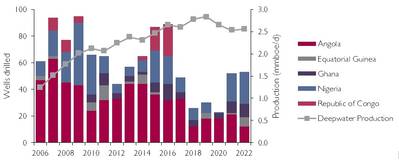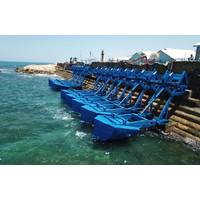West Africa: The Deepwater Bubble Bursts
A year ago, Douglas-Westwood (DW) commented that E&P companies within West Africa were focusing reduced Capex plans on high-quality deepwater assets in the region.
At the time, Brent crude was rebounding towards a mid-2015 peak of over $60 per barrel. However, in the months since this peak, oil prices plummeted once more, with Brent reaching lows of $26 per barrel in January 2016. DW has since revised its outlook considerably for West Africa’s deepwater prospects. With Brent on the rise last year and operators reiterating their commitment to deepwater assets in the region, DW foresaw the drilling of 483 deepwater development wells over 2016-2021 with deepwater production to continually increase to 4.0 mmboe/d by the end of this period.
After a myriad of project delays and cancellations, DW’s deepwater drilling forecast for 2016-2021 is 44% lower – production is now anticipated to peak at 2.8 mmboe/d in 2019 before declining to 2.5 mmboe/d by 2021. Many of these slippages have been high-profile developments for their respective operators. First oil from Shell’s Bonga South West-Aparo in Nigeria is now not expected until well into next decade as a result of cost overruns – further difficulties are likely should issues with extending the production licence continue. ENI’s long-mooted Etan project struggled to pick up momentum during the market upcycle, therefore, DW do not expect development to start until the early 2020s. Further down Africa’s Atlantic coast in Angola, Maersk Oil’s ambitious Chissonga development has been put on hold indefinitely – with the project office closed – as the Danish operator focuses on developments already in progress – notably Culzean in the UK North Sea.
The short term outlook for West Africa’s deepwater sector is still positive due to projects sanctioned before the market downturn. Large projects in Angola and Nigeria – including Egina (Total) and Kaombo (Total) will see deepwater production increase to 2019. However, once these developments are completed, a significant lull in activity is expected – just 23 deepwater wells will be drilled in 2020 compared with 89 in 2016. Should low oil prices persist in the medium term, DW do not expect to see a recovery to activity levels similar to that of recent years until well into the next decade.




